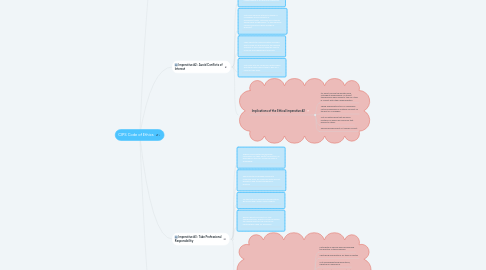
1. Imperative #1 : Protect the Public Interest and Privacy of Information
1.1. Carry out work or study with primary regard for public interest ( including health, security, safety, privacy, protection of the environment and social responsibility) and in accordance with regulatory and legislation.
1.2. Report to relevant authority problems that might result in serious damage to persons, organizations, property or the economy.
1.3. Work in accordance with legitimate rights of 3rd parties, and conduct all activities with due regard for ownership, property rights and privacy.
1.4. Treat all employer/client business information as confidential, respect copyrights, trade secrets, privacy and terms of license agreements.
1.5. Give credit where it is due on all reports, papers and ownership of code and designs.
1.6. Understand and comply with all obligations imposed on them under applicable privacy legislation, including The Personal Information Protection and Electronic Documents Act (PIPEDA), and any amendments to or successor legislation.
1.7. Not discriminate in any manner based on issues such as race, religion, sex, sexual orientation, age, national origin, or social class. Behave as directed regarding any other issue protected by legislation. Exemplify the values of equality, tolerance, and respect for others.
1.8. Implications of the Ethical Imperative #1
1.8.1. It's about our privileged access to systems. We have the opportunity to cause harm or injury to society, and a corresponding duty to protect society.
1.8.2. Ensuring intellectual property revealed during the course of work is kept confidential.
2. Imperative #2 : Avoid Conflicts of Interest
2.1. Maintain objective integrity and independence in professional judgement.
2.2. Not place personal interest or those of colleagues above interests of employers/clients, not place any interests above those of the public. ( If this hierarchy causes conflict you have an ethical dilemma).
2.3. Make efforts to notify all parties involved and to make full disclosure to the relevant authority if any conflict might be seen to occur by any independent 3rd party.
2.4. Not enter into any reciprocal relationships with third parties who stand to gain as a result of their work.
2.5. Implications of the Ethical Imperative #2
2.5.1. It's about Serving the greater good, "intelligent disobedience" or atleast transparency when asked to take on a task in conflict with other responsibilities.
2.5.2. Taking appropriate action on reasonably certain knowledge of unethical conduct on the part of a colleague.
2.5.3. Not accepting work that would be unethical or would use resources that belong to others.
2.5.4. Declining employment if it causes conflict.
3. Imperative #3 : Take Professional Responsibility
3.1. Achieve and maintain professional competency in their area(s) of practice, as described in the CIPS Common Body of Knowledge.
3.2. Demonstrate knowledge required to undertake work, be compliant with relevant legislation and accept standards of practice.
3.3. Tell the truth and avoid misrepresentation. Be honest and candid. Have integrity.
3.4. Balance quality and cost in a very transparent way. Quality includes meeting the requirements of the client AND meeting their need for timeliness.
3.5. Implications of the Ethical Imperative #3
3.5.1. Participate in lifelong learning regarding the practice of the profession.
3.5.2. Identifying qualifications for tasks accepted
3.5.3. Not misrepresenting qualifications, expertise or experience.
3.5.4. Not representing oneself as authority on topics in which one lacks competence.
3.5.5. Defining alternate strategy to reach goals and the implications of each strategy.
3.5.6. Ensuring that products and related modifications meet the highest professional standards possible.
3.5.7. Expanding one's capabilities and increasing one's competency
3.5.8. Treating conractors fairly
3.5.9. Being accountable for results and contractual obligations
4. Imperative #4 : Contribute to the IT Profession
4.1. Act in a manner that upholds the reputation of CIPS and the IT profession in general, in relationships with anyone with whom they work.
4.2. Support professional development for current and new CIPS members, for potential members, colleagues and subordinates.
4.3. Work to enhance the public's understanding of information systems and their current capabilities and limitations.
4.4. Make all reasonable efforts to counter misinformation that could bring the IT profession or CIPS into disrepute.
4.5. Be collegial. Maintain respectful workplace relationships.
4.6. Make reasonable effort to voluntarily participate in activities such as development of standards of practice and advancements in bodies of knowledge.
4.7. Implications of the Ethical Imperative #4
4.7.1. It's about promoting the IT profession and attracting new CIPS members.
4.7.2. Supporting professional bodies of knowledge through active participation
